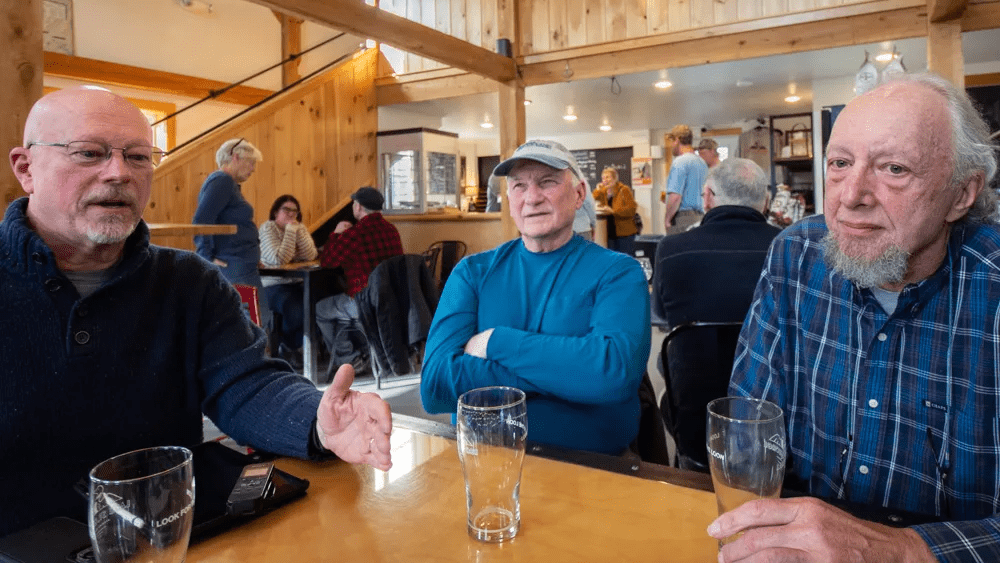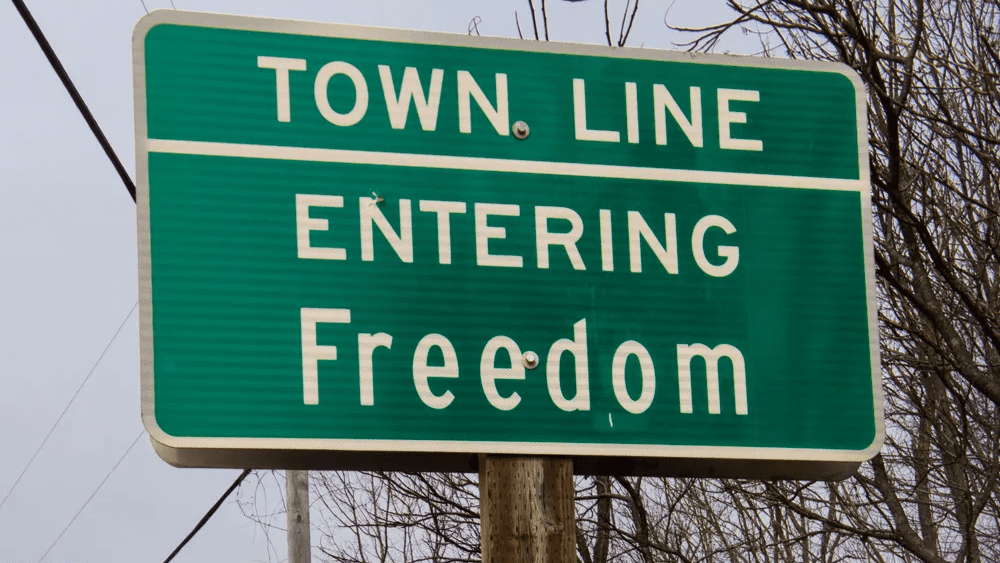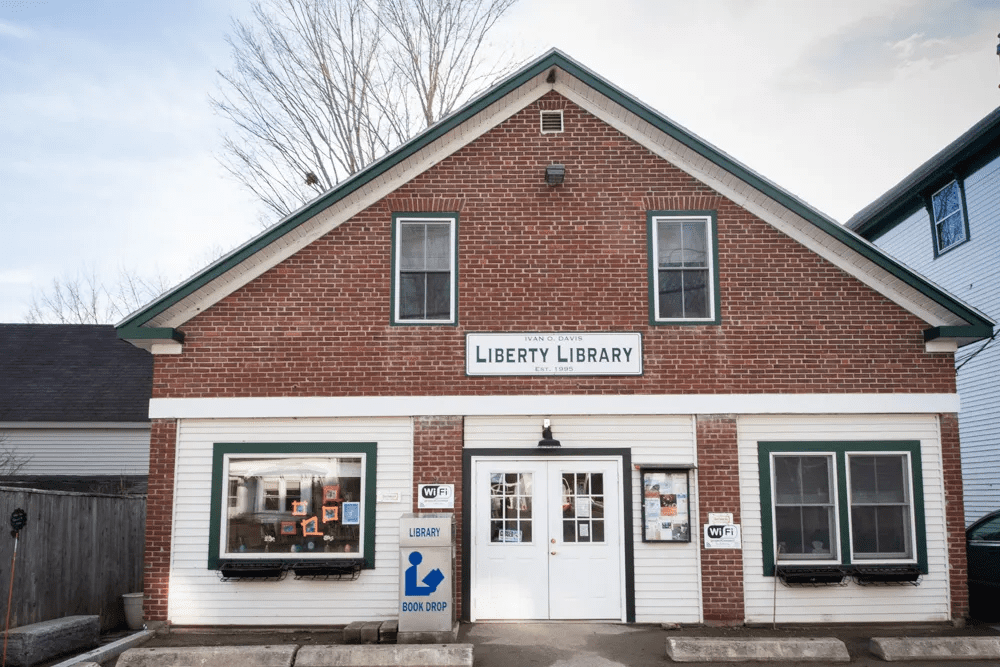A Republican, a Libertarian, and a Democrat meet over a beer in the small town of Liberty, Maine.
Bob Kurek, Joe Meadows, and Phil Bloomstein, each a selectman from their respective towns, may disagree on many issues, but they unanimously agree when it comes to broadband funding: Public funds should support publicly owned fiber-optic networks.
Kurek, Meadows, and Bloomstein are three of Waldo Broadband Corporation’s (WBC) five volunteer directors. A not-for-profit Broadband Utility District 30 miles east of Augusta, WBC’s member towns have a population averaging 31 residents per square mile, the lowest town densities in the state.
Now planning its second attempt to receive federal funding earmarked expand universal broadband service, the WBC believes Maine’s current funding requirements unfairly favor large incumbent providers.
In April, the three directors met with the Daily Yonder at Lake St. George Brewing Company.
Sitting in the sun-filled brewery wearing a blue T-shirt and baseball cap, Kurek leaned back in his chair.
“I still have dial-up,” Kurek, of Palermo, said. “I can afford Starlink and cable, but I keep dial-up to remind myself why I’m working this hard, holding out so that Maine Connectivity Authority will help us gain access to the funding we need to build broadband infrastructure out here in this remote region.
Bloomstein shook his head at Kurek’s slow connection speed.
“Being in meetings with him is impossible,” Bloomstein, of Freedom, said. “It’s like pandemic days.”
Meadows laughed. “We let him get away with it, though, because he (Kurek) is WBC’s godfather,” Meadows, from Liberty, said. “Bob got this whole thing started.”
When the pandemic highlighted the region’s desperate need for better internet, Selectman Kurek sent an email to neighboring towns of Liberty, Freedom, Montville and Searsmont.
He asked the other selectmen, “As small towns with limited clout and resources how do we address poor internet connectivity?”

That was the spark needed to form a five-town grassroots coalition, known then as Southwestern Waldo Broadband Coalition.
Surveys sent to all towns revealed a high dissatisfaction with local internet service providers (ISPs). Nearly a third of respondents said internet service was too expensive. Ninety percent of families along miles of wooded road stated they were underserved or not served at all.
A feasibility study came next. They were advised that owning their broadband infrastructure and becoming a Broadband Utility District could ensure universal coverage and generate a revenue surplus of $480,000 over the life of the 20-year project the coalition. Those findings led to town support to become a municipally owned Broadband Utility District (BUD).
In 2022, two years after its inception, Waldo Broadband Corporation worked closely with the Maine Connectivity Authority (MCA) to develop a competitive proposal for the first round of Connect the Ready. MCA is a quasi-governmental agency that receives state and federal funding and whose purpose is to achieve universal access of affordable high-speed broadband in Maine.”
The first cohort of MCA’s Connect the Ready program prioritized infrastructure funding for the projects and areas with sizable numbers of unserved and underserved locations. Late February 2023 WBC was awarded a conditional $11 million grant if the Broadband Utility District could come up with the required $4.6 million match.
Finding Match: The Sticking Point
“We were clear from the beginning that we didn’t have the required match,” Kurek said.
“With many in our community on fixed income, we promised not to raise taxes.” Bloomstein said. “We also pledged that no town will not incur any liability for the expansion.”
The directors assert the only way to finance the network is to float a revenue bond through one of the state financial agencies. To accomplish this, Waldo needs the state to help them access funds required and create a payback plan using a portion of the subscriber fees.
Myles Smith, the executive director of the Maine Broadband Coalition, supports their efforts.
“We’re all paying for broadband expansion with our taxes. Those towns that are willing to take on the responsibility of ensuring our taxes are well spent, well into the future, are particularly worthy of public investment and support. They’re taking the responsibility for being good shepherds of our tax funds.”
Responding to concerns of BUD stakeholders, MCA recently launched a new initiative, Help for BUDS. As stated on their website, “the agency is partnering with FAME (Finance Authority of Maine), the Maine Municipal Bond Bank, and other partners to develop a strategy to engage critical stakeholders, deploy targeted technical assistance, and craft appropriate funding programs that can help BUDs fulfill their potential as a key way to enabling regional scale impact for improved connectivity and digital equity in Maine.”
After MCA’s first strategic partnership roundtable in May, with application deadlines two months away, Waldo Broadband Corporation directors try to remain cautiously optimistic, hoping the speed of fiber doesn’t outpace the speed of bureaucracy.
“Hollowing Out” the Customer Base
Kurek told the Daily Yonder: “If you look at what we’re trying to do if you look at what’s the best way to take taxpayer dollars and spread them as far as they’ll go and give the very people, the taxpayers, the best possible return long term, this is by far the best plan.
“But it requires the state to say, ‘we’re going to work with you, we’re going to give you tax dollars, but we’re also going to help you obtain the financing for the debt that you need because five small poor towns can’t come up with debt guarantees for $4.6 million in revenue bonds.’”

Meadows added, “When MCA gives money to big ISPs like Spectrum to help them build out within a certain town, that frees up money within those companies. They can then go into towns where they’re not applying for a grant to partially extend their network into the more populated areas of communities.
“They go right down the middle of population-dense areas, taking the low-hanging fruit in that town. We call it hollowing out.”
According to Meadows, once this hollowing out happens, the probability of residents living along miles of dirt roads getting service goes to near-zero.
“MCA, the legislators, and Maine’s governor need to consider these ‘big picture’ scenarios to a much greater degree if they want every Maine resident to have access to affordable, reliable broadband,” Meadows asserted.
As the next round of funding approaches, broadband advocates watch closely to see what role, if any, the state will take to help hard-to-reach, less affluent towns provide universal coverage at affordable rates.







